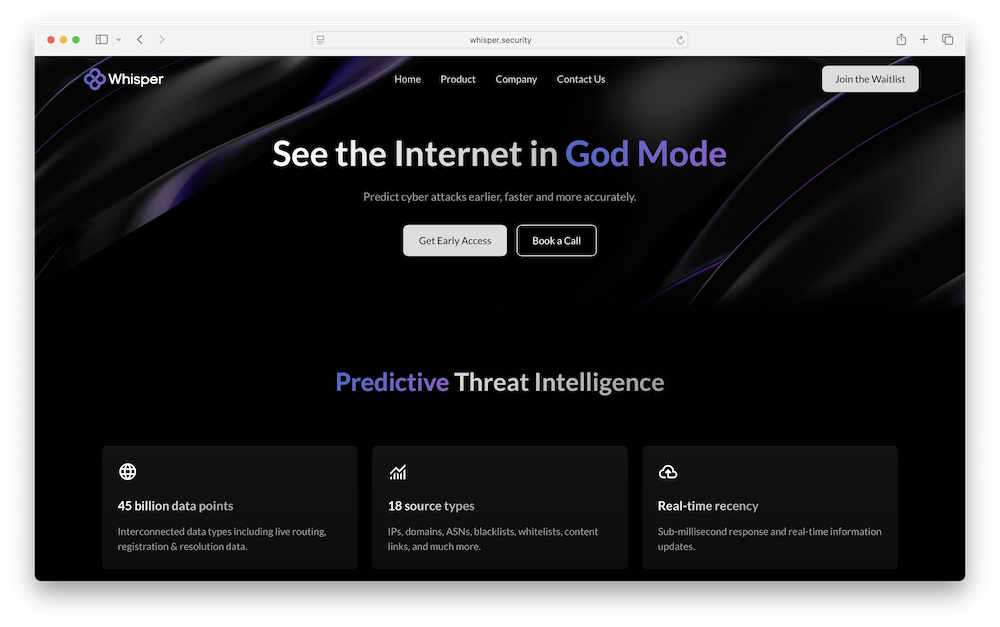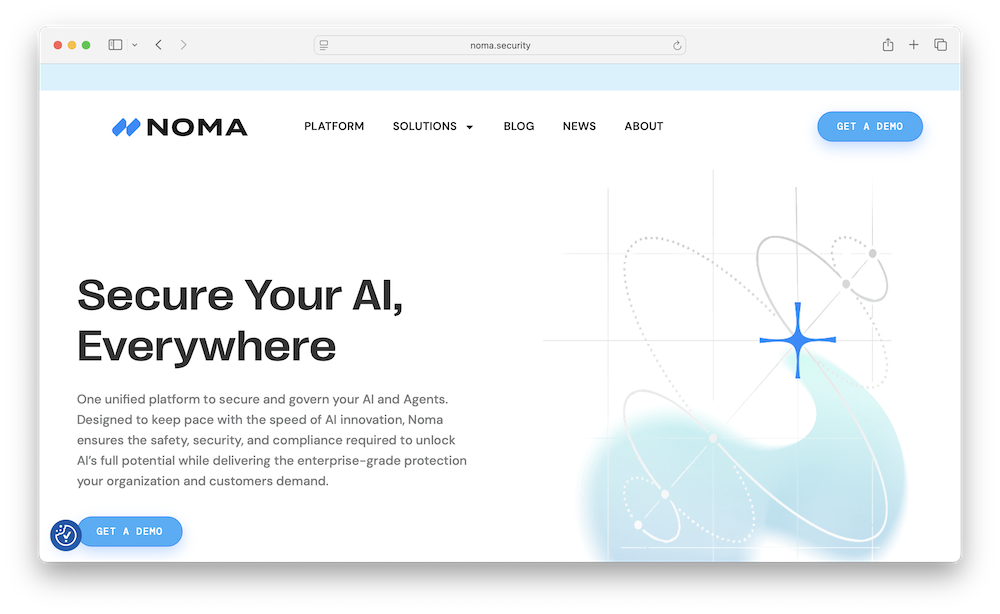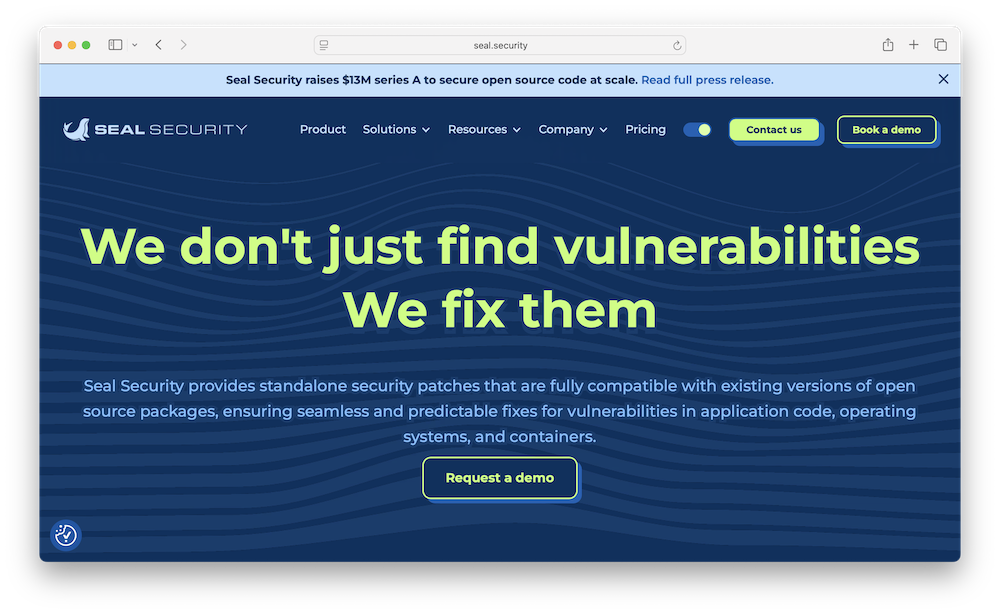In today’s digital landscape, cybersecurity platforms utilizing .Security domains are working to address the growing complexity of online threats. XYZ Registry is committed to supporting innovators in the security space, and it is encouraging to see organizations adopting industry-specific domain endings like .Security to establish their presence. Today, we’ll introduce you to three companies using .Security domains to advance predictive threat intelligence, enterprise protection, and safer digital environments: Whisper.Security, Noma.Security, and Seal.Security.
Whisper.Security – Gandi customer – (Netherlands)

Whisper.Security is the online home of Whisper, a cybersecurity platform founded in January 2025 in Amsterdam. The company states that it provides real-time visibility into internet infrastructure to help predict cyber attacks earlier, reduce false positives, and enhance AI-driven security operations. In July 2025, Whisper raised €1.6M (approximately $1.75M) in pre-seed funding. The round was led by Atlas AI^VB Fund I, with participation from Antler, D11Z, Tioga Trust, and Volve Capital.1
Information on the company’s website describes Whisper’s platform as powered by a large-scale internet knowledge graph mapping more than 45 billion interconnected data points from 18 source types, including IPs, domains, Autonomous System Numbers (ASNs), blacklists, whitelists, and content links. Data is updated in real time with sub-millisecond response times, which supports predictive threat intelligence.
Notable features include:
Whisper is co-founded by CEO Leonardo Carlo Calisse, CPO/CIO Soroush Rafiee Rad, and CTO Kaveh Ranjbar. According to LinkedIn, Leonardo is a repeat founder with experience in scaling startups. Soroush holds two PhDs in mathematics and complex systems and has held research positions at Università degli Studi di Milano and the University of Amsterdam’s Institute for Logic, Language and Computation. Kaveh served as Chief Information Officer at RIPE NCC from 2013 to 2023, where he oversaw core internet infrastructure services such as K Root DNS, RIPE Atlas, and RIPEstat. You can learn more by following the platform on LinkedIn @whispersecurity and by visiting Whisper.Security.
Noma.Security – GoDaddy customer – (Israel)

Noma.Security is the online home of Noma Security, an enterprise platform focused on securing AI applications and autonomous agents. The company emerged from stealth in November 2024 and quickly grew its customer base across sectors including finance, life sciences, retail, and technology. In July 2025, Noma raised $100M in Series B funding led by Evolution Equity Partners, with continued backing from Ballistic Ventures and Glilot Capital.2
According to its website, Noma Security positions itself as the first comprehensive AI security and governance platform for enterprises. The platform provides full visibility and control across AI environments, from model development to runtime and agent operations. Its services include continuous discovery of AI assets, proactive risk management through automated scanning and red teaming, and runtime protection that enforces guardrails on models and agents in production. Noma’s approach is designed to address the unique security and compliance challenges posed by rapid adoption of agentic AI.
Noma Security is co-founded by CEO Niv Braun and CTO Alon Tron. According to LinkedIn, Niv previously spent nearly five years at Verint, where he managed a 50-person group that launched a new cybersecurity product line, and earlier served in Unit 8200 as a Cyber Security Group Manager and Head of a Cyber Intelligence Team. Alon’s background includes serving as Data Science Lead at Interai and working as a development consultant for Israeli Military Intelligence before co-founding Noma. Both bring experience in cybersecurity and applied machine learning to the company’s focus on AI security and governance. You can learn more by following the platform on LinkedIn @noma-security and X/Twitter @NomaSecurity, and by visiting Noma.Security.
Seal.Security – GoDaddy customer – (Israel)

Seal.Security is the online home of Seal Security, a Tel Aviv, Israel–based cybersecurity company founded in 2022. The platform was developed by three software vulnerability specialists with over 30 years of combined experience, and positions itself as the first generative AI solution for automated, scalable remediation of open source vulnerabilities. In July 2025, Seal Security raised $13M in Series A funding led by Vertex Israel, with participation from More Investments, SBI Group, and CCL, bringing its total funding to $20M.3
According to the company’s website, Seal Security provides centralized control over the vulnerability patching process by delivering standalone backported security patches in multiple programming languages. This approach is designed to help organizations remediate vulnerabilities across direct and transitive dependencies without requiring new versions or developer intervention. Key services include fixing vulnerabilities in container images, securing Linux distributions including end-of-life versions, and delivering compliance-ready base images for frameworks such as FedRAMP, PCI DSS 4.0, and NYDFS 500. Testimonials on Seal.Security highlight the platform’s impact. “Thanks to Seal’s product, we swiftly addressed security vulnerabilities and updated outdated code packages, saving us valuable time, which we estimated by months of engineering work,” said Gad Meyer, Director of Software Engineering at PayPal. Matt Farmer, Principal Site Reliability Engineer at cybersecurity research platform Censys, noted, “Seal Security enabled us to eliminate a major ongoing risk to our development roadmap. The integration with their solution was simple, allowing us to quickly achieve significant patching coverage and ensure the seamless remediation of vulnerabilities.”
Seal Security is co-founded by CEO Itamar Sher, CTO Lev Pachmanov, and CPO Alon Navon. According to their LinkedIn profiles, Itamar previously founded Gilgamesh Cyber Solutions and worked in vulnerability research roles. Lev held senior engineering and architecture roles at PayPal, Curv, and Cymmetria before co-founding Seal. Alon also came from PayPal and Curv, where he managed product development, and earlier served for nearly nine years in the Israel Defense Forces with responsibilities in cybersecurity and product leadership. Together, they bring a mix of vulnerability research, product management, and infrastructure experience to Seal’s mission of addressing open source software risks.
Seal Security upgraded their domain from sealsecurity.io to Seal.Security, a transition that emphasizes the company’s alignment with its core mission of securing open source code at scale. The move highlights the platform’s focus on vulnerability remediation while adopting a domain extension directly tied to the industry. The .Security domain helps strengthen the company’s digital identity, making it easier for customers and stakeholders to associate the brand with cybersecurity solutions. You can learn more by following the company on LinkedIn and X/Twitter, and by visiting Seal.Security .
The adoption of .Security domains highlights how organizations in the cybersecurity sector are choosing industry-specific namespaces to strengthen their digital identity. Domains like Whisper.Security, Noma.Security, and Seal.Security demonstrate how companies can align their online presence with their core mission while making it easier for stakeholders to associate them directly with security-focused solutions. .Security underscores a clear connection to the industry, offering a memorable and relevant choice for companies addressing today’s complex digital threats.
1.https://startuprise.co.uk/whisper-cybersecurity-startup-secures-fund-for-the-next-gen-cybersecurity-platform/ 2.https://www.wsj.com/articles/noma-security-raises-100-million-to-keep-ai-agents-from-going-rogue-1dba0b98 3.https://finance.yahoo.com/news/seal-security-raises-13m-series-130000953.htmlXYZ is proud to share about the many incredible members that make up the XYZ community! We encourage you to do your own research before using the products and services of the websites we feature. The information about products and services contained in this blog post does not constitute endorsement or recommendation by XYZ.